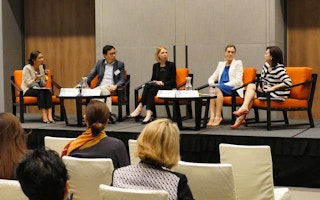Businesses in Singapore came together last Friday to discuss the United Nations’ Sustainable Development Goals (SDGs) and the challenges and opportunities they bring.
To continue reading, subscribe to Eco‑Business.
There's something for everyone. We offer a range of subscription plans.
- Access our stories and receive our Insights Weekly newsletter with the free EB Member plan.
- Unlock unlimited access to our content and archive with EB Circle.
- Publish your content with EB Premium.
The SDGs, also known as the Global Goals, consist of 17 goals and 169 targets which “set out a vision for ending poverty, hunger, inequality and protecting the Earth’s natural resources by 2030”.
The private sector is seen as a key contributor to achieving the SDGs, given how it can shape a country’s sustainable economy.
“The SDGs are a huge landmark, globally, with governments, private sector and civil society agreeing to work together,” said GCNS executive director Wilson Ang at the inaugural session of the Thought Leadership Series held at the Unilever Four Acres Singapore campus.
The series aims to make Singapore businesses aware of global issues around sustainability and see how these are relevant to them. The first session on Friday was organised by GCNS, the local chapter of the UN Global Compact aimed at promoting corporate responsibility, in partnership with global sustainability consultancy Corporate Citizenship and Unilever.
Junice Yeo, Corporate Citizenship’s director for Southeast Asia, shared with the audience that a global study in 2015 by Corporate Citizenship on how much businesses understood the SDGs highlighted that only one in four businesses were aware of the UN’s goals, but had no current plans to adopt them. Another one in six said their organisation was “not aware of the goals”.
These figures are likely to have changed today as it has been seven months since the announcement of the SDGs and there has been a lot more publicity since. But in the Singaporean context, “these figures might still be accurate, with fewer companies (compared with other countries globally) involved in the Global Goals,” said Yeo.
Ang said the compact was organising the series of talks to help Singaporean business leaders understand the SDGs, including ways to contribute and leverage from the goals.
The role of businesses
The SDGs “herald a new era as it involves the private sector,” said Yeo, adding that “they are the new defacto standard today for designing, measuring and accounting business impact”.
She singled out three opportunities from SDGs for businesses: New revenues from innovative products and services, being able to continue to operate in countries where future policies and legislations will be shaped by the SDGs, and forging partnerships with other companies, governments and NGOs.
Speakers at the session collectively emphasised the alignment of their business practices to the SDGs.
Diageo’s skills and empowerment manager for sustainable development, Georgie Passalaris, shared that Diageo’s new 2020 targets development happened in parallel to the SDGs launch.
“As such, 11 out of 20 targets are aligned to the 17 SDGs, so we are confident that our priorities, monetary investments and resources allocation are aligned to the SDGs,” she added.
Passalaris further highlighted the need for developing a shared language around sustainability to communicate initiatives to people in the external communities who understand sustainability but may not be aware of Diageo’s work.
While businesses see challenges related to integrating sustainability into their operations, David Kiu, Unilever vice president for communications and sustainability, observed that it was important to look at sustainability “not as a cost, but helping us to do better”.
“
Action-oriented partnerships are important to develop new innovations, solutions and approaches to address the Global Goals.
Caroline Whatley, head of corporate engagement at centre, Save the Children
Kiu said the “challenges the goals aim to tackle are aligned with our own ambitions set out in the sustainable living plan”. The plan aims to halve environmental impact, improve health and well-being for over 1 billion people and enhance livelihoods.
The speakers from Unilever, Diageo and property developer City Developments Limited (CDL) all stressed the need to generate a business case for sustainability to achieve the SDGs.
“Demonstrating that there is a strong business case and engaging the leadership is essential,” observed Esther An, CDL’s chief sustainability officer. An added that buy-in was the biggest challenge but communication is key.
The panel unanimously agreed on partnerships being crucial to achieving the SDGs. Caroline Whatley, head of corporate engagement at Save the Children, noted that “partnerships should be embedded across core business operations to deliver sustainable change”.
She highlighted the importance of action-oriented partnerships to develop new innovations, solutions and approaches to address the Global Goals.
Unilever’s Kiu added: “Unilever relies on partnerships with others to mobilise collective action to achieve the SDGs and create system change.”
“Exchanges, like today’s event, is a good example of bringing stakeholders together to drive the system changes needed towards achieving the SDGs by 2030,” said Ang.










